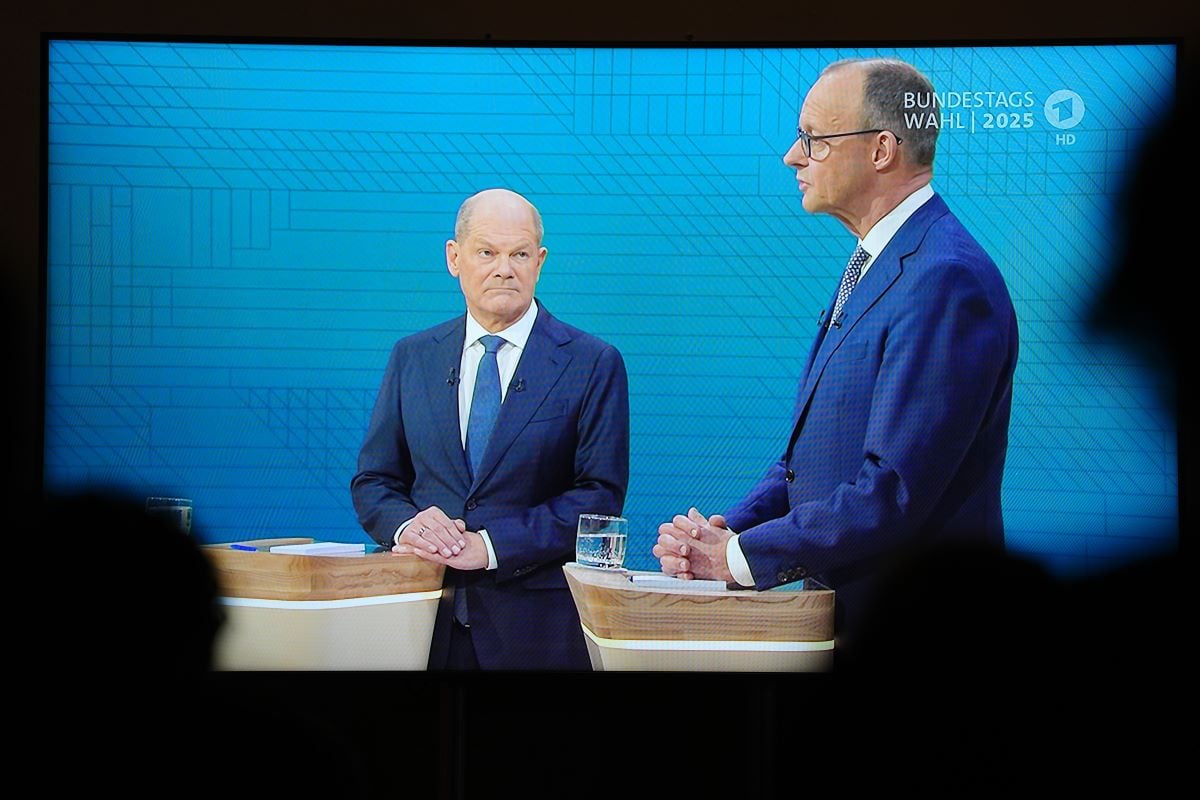After a four-way debate between the chancellor candidates from the centre-left Social Democrats (SPD), the Greens, the centre-right Union (CDU/CSU) and the far-right Alternative for Germany (AfD), all parties are now entering the final spurt to the federal election on February 23rd.
Union chancellor candidate Friedrich Merz, whose conservative bloc is on course to gain the most votes, suggested that the SPD and the Greens could be coalition partners – effectively keeping both options open, while admitting that he had “great doubts” about the liberal Free Democrats (FDP) which have been polling below five percent for weeks.
He once again ruled out cooperation with the AfD.
Each of the parties’ leaders leaned into claims that supported their election campaigns.
The leading candidates from the CDU and SPD, for example, both had big points to make about migration. Whereas the Green’s leader and economy minister voiced support for a wealth tax, while the AfD candidate bashed the carbon tax.
Here’s a look at the truth behind the candidates’ major claims.
Alice Weidel says the carbon tax will raise fuel prices by €1 per litre
In line with the far-right party’s rejection of any tax in the name of climate protection, Alternative for Germany (AfD) top candidate Alice Weidel criticised Germany’s current climate and energy policies several times on stage.
Going in on the point against current Economics Minister Robert Habeck, Weidel claimed that Germany has the “highest electricity prices in the world”.
She blamed high energy prices on the carbon tax in particular, adding that fuel prices could be increased by up to one euro per litre.
What’s true?
Germany does have a CO2 levy, adopted at the beginning of 2021, which has an impact on the cost of gas and diesel fuels as well as other transport and building costs.
At the beginning of 2025 the carbon price rose from €45 per tonne to €55. According to reporting by RND, this has contributed to gas and diesel fuel prices rising by about three cents per litre.
What’s false?
Weidel’s suggestion that prices could rise by up to €1 per litre in the coming years is more than three times higher than the most extreme estimates by the German automobile association (ADAC).
The ADAC expects fuel prices to increase further next year, but only by up to a few cents per litre. Then, in 2027 when carbon price certificate prices are to be determined on the market (and could be expected to double in price), ADAC suggests fuel prices could shoot up by as much as 19 cents per litre.

Still, the ADAC's highest estimate for fuel price increases is significantly lower than that suggested by Weidel.
READ ALSO: Why fuel prices in Germany are on course to rise significantly
Weidel also exaggerated the high cost of electricity in Germany.
While German household electricity prices are higher than in many countries, higher average prices were seen in Italy, Ireland and Denmark in 2024, according to Statista. Belgium and the United Kingdom also had the same average electricity price as Germany last year.
Friedrich Merz says Germany pays €300 million in aid to Afghanistan
Christian Democrat leader and expected future chancellor Friedrich Merz called for an increase in deportations to Afghanistan during the debate, suggesting that Germany should use the money it gives in the form of development aid as a means of leverage over the Taliban to do so. He suggested that Germany “gives €300 million in development aid” to the country.
What’s true?
The German government suspended cooperation with Afghanistan after the Taliban took control three and half years ago, but continues to provide humanitarian aid to the country.
The German Ministry of Development Aid maintains that it does not conduct negotiations with, or make financial commitments to, the Taliban regime.
Meanwhile, as of 2023, €371 million had been paid for development aid through the World Bank or non-governmental organisations.
What’s false?
Merz's statement is at least misleading in that it seems to suggest that Germany is providing such a large sum on an annual and continued basis, whereas the €371 million figure was for two years following the regime change in Afghanistan.
Also, whether or not this aid funding could realistically be used to exert political pressure on the Taliban is unclear.
Olaf Scholz says his administration increased deportations by 70 percent
Speaking of deportations, incumbent Chancellor Olaf Scholz didn’t miss his chance to try and steal some of Merz’ big-deportation energy by reiterating his claim that Germany’s government reduced ‘irregular migration’ by 100,000 people in 2024 and that the number of deportations also dramatically increased – by 70 percent since 2021.
Missing context
Scholz had made similar claims in a previous debate against Merz last week.
As The Local reported, it is factually correct that asylum applications fell by about 100,000 last year, and that the number of deportations in 2024 was about 70 percent higher than in 2021.
However, the claim lacks some important context.
READ ALSO: Scholz vs Merz - What we learned from Germany's 'pretty boring' election showdown
Overall, asylum applications have dropped significantly since 2015/2016 when they peaked during the migration crisis. Since then, there was a smaller peak following Russia’s invasion of Ukraine, which has since fallen again.

Looking at the number of asylum applications over time, they tend to peak during moments of political instability in countries. To imply that falling migration numbers have anything to do with the current government’s leadership could be dubious.
Regarding deportations, the increase given by Scholz is compared to 2021 specifically, a year which had few deportations due to Covid pandemic lockdowns. Compared with 2015 or 2019, for example, the number of deportations carried out last year was not unusual.
Robert Habeck says Germany's billionaires earned €28 billion more in 2024
Economy minister Robert Habeck of the Greens – along with leaders from SPD, the Left party and the BSW – is calling for higher taxes for Germany’s ultra-wealthy.
Driving home the need for higher taxes for the richest individuals, Habeck said: "We have 130 billionaires in Germany – billionaires, not millionaires. They gained €28 billion more assets last year."
What’s true?
Habeck’s statement rings true overall – in fact his mistake was only that he underestimated the number of billionaires in Germany.
As opposed to the 130 billionaires that Habeck suggested, Manager Magazine recently reported that Germany is home to 249 billionaires – more than ever before. (Other reports have put Germany’s billionaires at 130.)
Ahead of the recent meeting of the world’s business elite in Davos, Oxfam put forward a report warning that “billionaire wealth in the EU surged by nearly €400 million per day in 2024”.
Oxfam suggests that countries need to tax the richest and abolish tax havens to decrease income inequality around the world, which supports calls from Habeck and leaders of Germany’s left-leaning parties to tax the wealthiest further.
According to the income tax assistance association, Aktuell Lohnsteuerhilfeverein, the tax plan put forward by the Greens would relieve taxes for low and middle income earners, while taxing large assets more.
In comparison, the SPD's tax plan is expected to reduce taxes for 95 percent of taxpayers, while the CDU/CSU tax plan would primarily reduce income taxes for middle and high income earners. The AfD's plan also benefits high income in particular, with no plans for wealth or inheritance taxes.

Comments